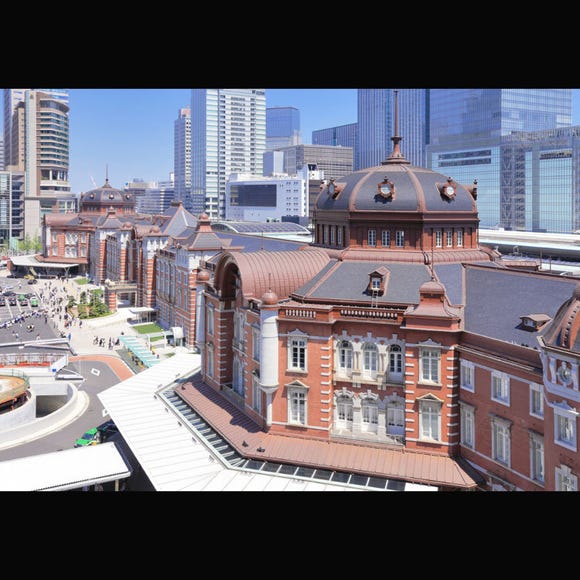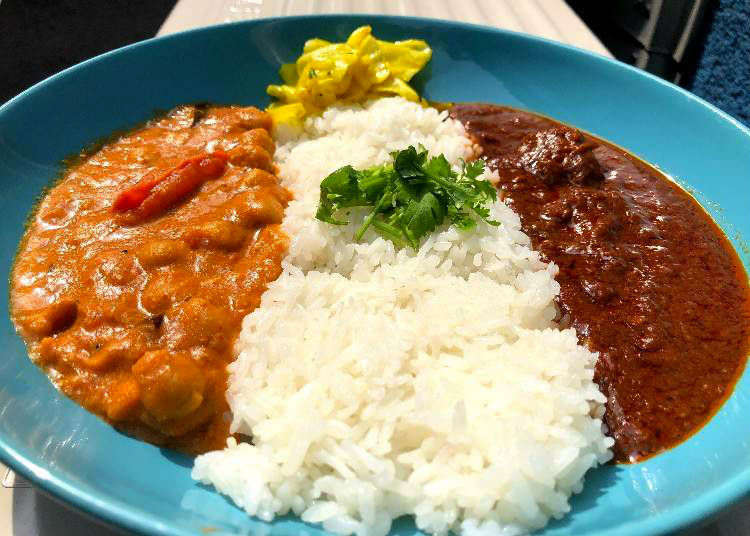
While curry is India’s most iconic gourmet delight, it had made its way to Japan and people have utterly fallen in love with it here as well, to a point where Japanese curry can easily be called a national dish! However, this Japanese curry is quite different from the Indian curry that you might be used to – it’s thick like a stew and always eaten with rice. Carrots, onions, potatoes, and meat are common ingredients, with especially the choice of meat differing depending in which corner of Japan you are. East Japan prefers pork, while west Japan is all about beef! Another big difference is that Japanese curry is rather mild compared to the original, often more mild than spicy.
This curry style developed in correlation as to how curry was introduced to Japan – by the British. Indian spices spread throughout the world in the wake of British colonialism, and British sailors mixed curry powder into their stew to prolong its shelf life. This stew is what came to Japan as “curry.”
Want to Savor Japanese Curry? Visit Unique Curry Shops in Shinjuku!
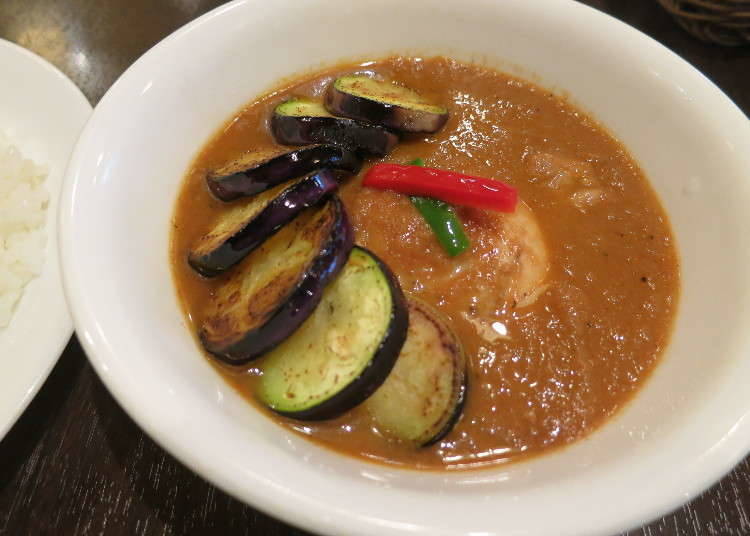
Japanese curry has been a popular make-at-home dish all around Japan for decades now, but there are also a plethora of restaurants specializing on the delicacy. From authentic Indian curry to Japanese-style, there’s a plethora of different styles and tastes out there – even some thoroughly unique ones that you’re sure to have never tried before, blending various styles into all-new creations.
This time, we’ve combed the busy shopping and business area of Shinjuku for its’s top three unique curry shops that make waves all around the metropolis. They’re all full of charm and originality, as well as conveniently located next to major sights to easily fit a curry experience into your sightseeing schedule!
1. Curry Kusamakura: Indian-style Curry that’s Delicious without Flour, Beef, and Pork!
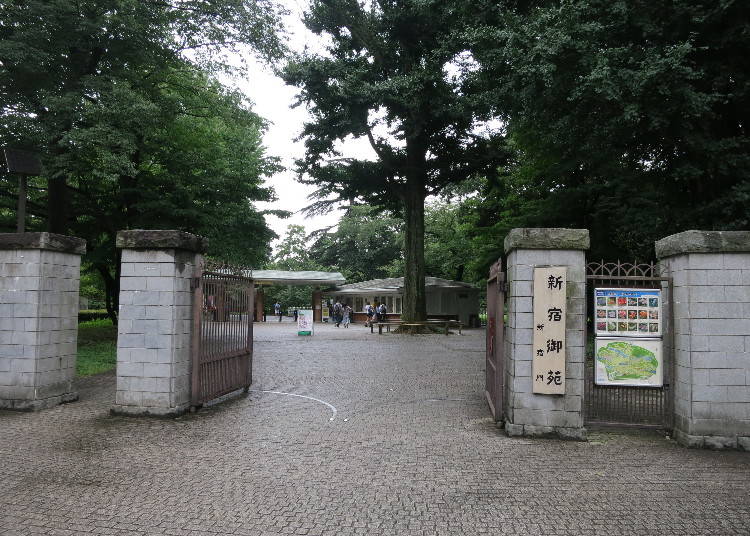
Our first stop is just a stone’s throw away from Shinjuku Gyoen National Garden. The park was created in 1906 as a royal garden but was opened to the public after the war. It boasts a British landscape garden, a French formal garden, and a Japanese garden united in one vast park. With its three distinct sceneries, it is a favorite oasis of relaxation for both locals and tourists.
Curry Kusamakura is right at the entrance of Shinjuku Gyoen, in front of the park’s Shinjuku Gate. It’s on the second floor of a building that houses several different businesses, but all you have to do is look out for the bright yellow sign. It looks small from the outside but once you step inside, a surprisingly wide and open space welcomes you. About 20 seats are spread throughout the shop and there even is a reading space to cater to solo diners. A lot of curry specialty restaurants in Tokyo tend to be quite small with few seats, but Curry Kusamakura beckons with its feeling of relaxed openness.
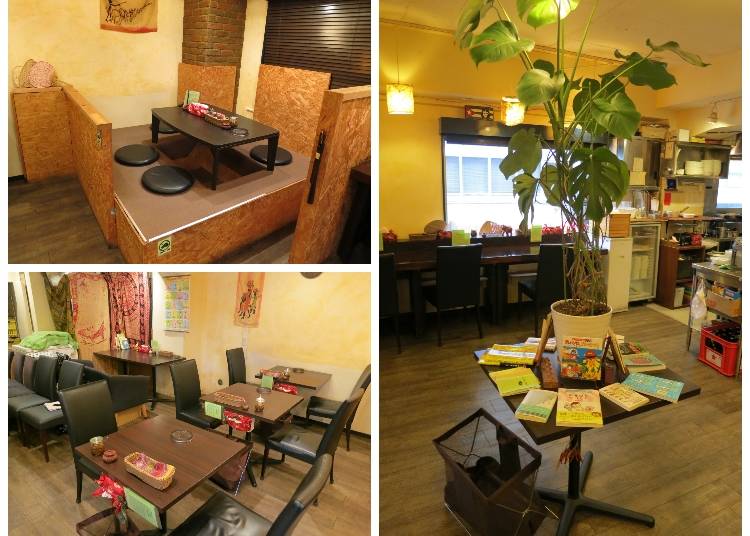
1) A raised seating area commonly found in Japanese restaurants. During winter, a heated table called “kotatsu” will warm you up right to the core! 2) The center of the room is decorated with an ornamental plant. Books, mostly matching the shopkeeper’s hobbies, are free to be picked up and enjoyed by the guests. 3) The comfortable able seats are the best choice for families with small children.
Curry Kusamakura’s flavor is rather different from the standard Japanese-style curry. One big point is that it does not use flour for its roux, which is where the usual thickness comes from. That doesn’t mean this curry is thin, but the thickness comes from the onions that serve as the roux’ base. One entire grated onion goes into every dish, which earned it the nickname of “onion curry.” Since only a small amount of vegetable oil is used, each spoon feels wonderfully light and not heavy at all. It’s a perfect curry even for those days on which you don’t feel like eating too much or too heavy.
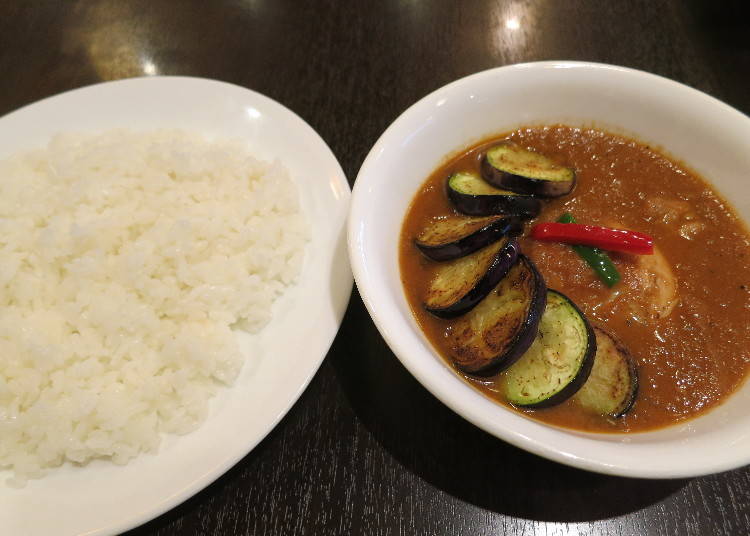
Eggplant and chicken curry for 880 yen. Adjust how hot your plate should be on a scale from 1 to 10. The regular “medium spicy” is 1 and the it gets spicier the higher your number! The shopkeeper’s recommendation for this dish is a 3. The meat is chicken only, so people avoiding beef and pork can enjoy this without worrying!
One characteristic of this shop is that it uses an original blend of spices. Usual Japanese-style curry only has a faint spice note, but here the flavor is rich and prominent. This curry’s chicken has been simmered in that flavorful mix, for three entire hours on low temperature. That gives it a wonderfully juicy texture that goes great with the grilled eggplant sitting on top.
Curry Kusamakura’s curry menu features six dishes in total. They’re all very reasonably priced and don’t exceed 1,000 yen, which is a result of the owner’s own preferences: “I kind of really don’t like it when curry costs more than 1,000 yen. (laughs)” The rice serving generally is 250 grams, but you can increase it to 350 grams for free if you’re especially hungry. For a smaller portion of 150 grams, you’ll get a discount of 30 yen.
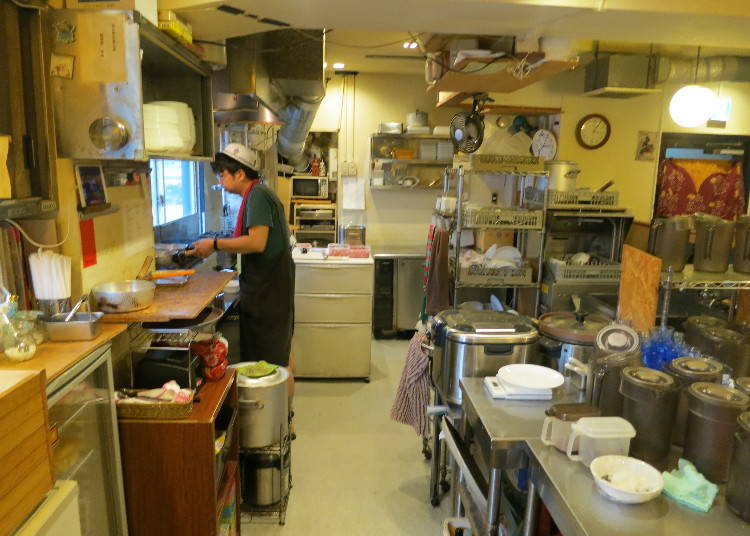
You can get a glimpse of the shopkeeper at work in the open kitchen.
By the way: Curry Kusamakura means “curry grass pillow.” The expression “grass pillow” is a Japanese epithet (a term used to characterize something) in poetry representing “travel” or “journey.” Traveling wasn’t near as convenient about 1,200 years ago and usually meant camping out in the open field, simply laying down in the grass, hence the grass pillow. Curry Kusamakura’s owner has a vast experience of traveling like this himself while also often being invited by the locals, touching him deeply and revitalizing him. Based on these experiences, he called his shop Kusamakura with the desire to “cook curry for people to make them happy and give them energy.”
-
Curry KusamakuraCurry 草枕
- Address 〒160-0022 東京都新宿区新宿2-4-9 中江ビル2階 / 2-4-9 Shinjuku, Shinjuku-ku, Tokyo, 160-0022, Japan
-
Nearest Station
Shinjuku-sanchōme Station (Toei Shinjuku Line, Tokyo Metro Marunouchi and Fukutoshin Line), 3 minutes on foot
- Phone Number 03-5379-0790
Hours: 11:30 a.m. – 3:00 p.m.; 6:00 p.m. – 9:00 p.m.
Closed: open every day (except for New Year’s)
2. Beef Tendon Little Curry House (Gyū-suji Chiisana Karē-ya):
The Tiniest Curry Place Boasts the Greatest of Japanese-style Curry Flavors!
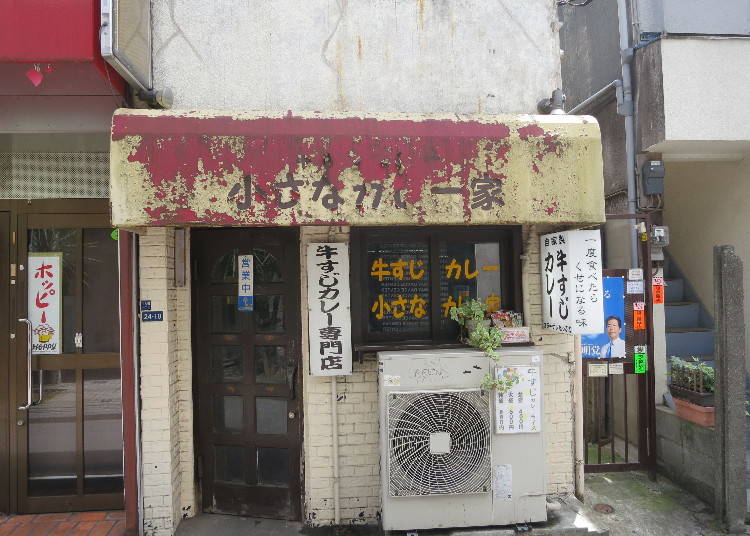
A place barely bigger than a tent!
Our next curry spot is something truly unique. A lot of people think of Japan and have an imagine of “neat and sophisticated” in mind, but the Little Curry House’s first impression is that of yellow paint peeling of the shop’s awning. If you don’t know what this place is, you’d probably steer clear of it. However, Gyū-suji Chiisana Karē-ya, as the place is called in Japanese, is a secret tip among locals who swear by its amazingly delicious dishes – indeed, you’ll see a long queue forming up in front of it during lunchtime. It’s close to Okubo Station, which is right next to Shinjuku Station. The Okubo area is often called Tokyo’s Koreatown and is a hot spot for everyone curious about Korean skincare and cosmetics, K-pop, and so on! From the station, this little curry paradise is just a 5-minute walk away.
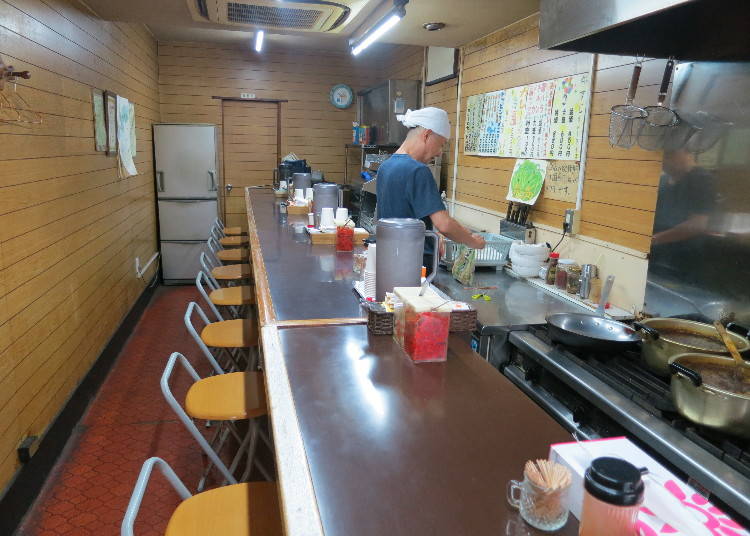
The interior is small but clean and tidy. Originally, the place seemed to have been a bar.
The somewhat dubious exterior hides a neat and clean little shop. We did ask the shopkeeper why the outside is so rugged and tattered. “Well, the awning is made of cheap material, so even if we redo it, it won’t last for long. It may look like it’s dirty but it’s actually just a tattered tent.” And indeed, if you look at the rest of the exterior, it’s actually rather cute – the white brick wall, the plant on the window sill, and so on. You’d think that the tattered awning mars the reputation of the store, but Little Curry House’s fans have come to adore it. “It’s the characteristic of this shop! Don’t replace it!” is an often-voiced opinion.
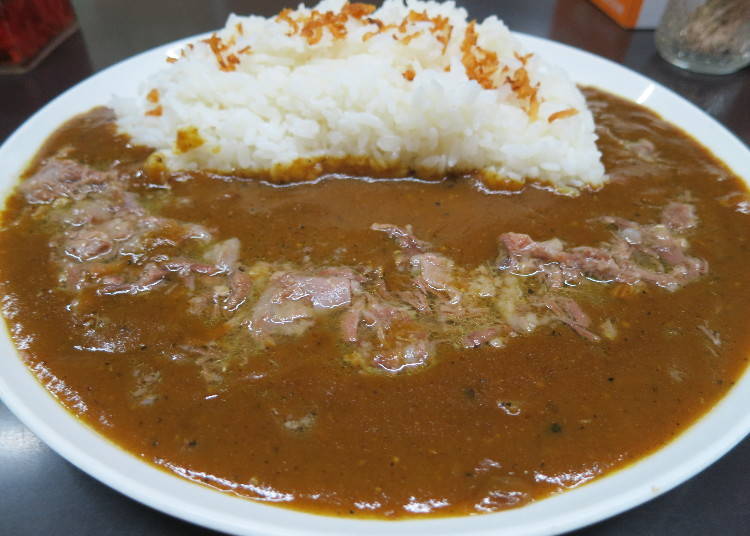
Beef tendon curry rice (regular size) for 450 yen. It’s amazing that this dish is so cheap!
This curry is the real Japanese style, thick and rich. The main ingredient is domestically produced beef tendon, after which the shop is named. It’s stewed in a pressure cooker for 12 hours, extracting all the collagen. It’s not stewed together with the curry but separate, brought together upon serving. This curry features plenty of collagen, and the regular size (which is a lot!) is available for only 450 yen! Alongside this hefty plate come 450 grams of rice – if that’s still not enough for you, up the size to 600 grams of rice, costing you no more than 600 yen in total. The super-sized portion features one whole kilogram of rice for 880 yen. As the shop opened in 2002, the price for a regular size was only 350 yen. The slight increase is due to a larger consumption tax, but it is still irregularly cheap for such a delicious meal!
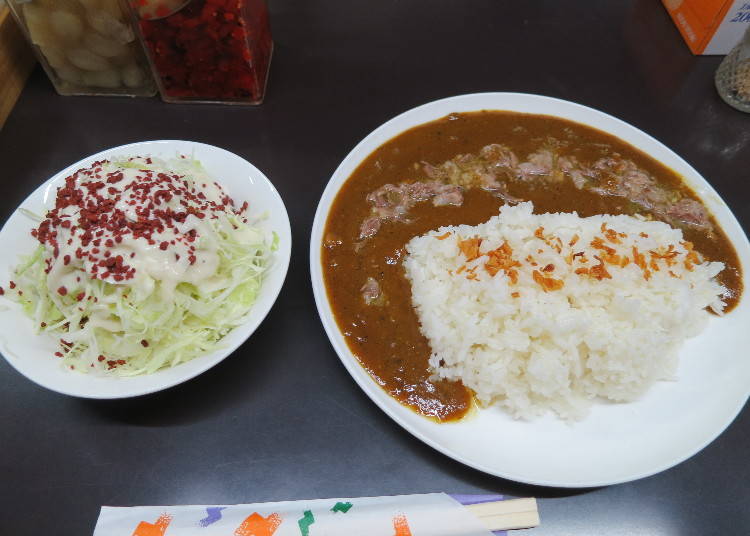
The coleslaw on the side is only 50 yen, so the meal you see in the picture only cost us 500 yen in total.
We recommend ordering coleslaw as a side. Crispy bacon chips and a dressing are the toppings for the finely shredded cabbage, boasting a simple yet delectable taste for the small price of 50 yen. The serving is quite large as well, but most regulars seem to order it alongside their curry.
The curry itself has a nice and mild taste that stays true to the essence of Japanese curry. The tender beef tendon matches this flavor perfectly and if you’re curious about the authentic taste of Japanese-style curry, this is an absolute must-try!
-
Gyū-suji Chiisana Karē-ya牛すじカレー 小さなカレー家
- Address 〒169-0073 東京都新宿区百人町1-24-10 / 1-24-10 Hyakunincho, Shinjuku-ku, Tokyo, 169-0073, Japan
-
Nearest Station
Jr Okubo Station, 2 minutes on foot
- Phone Number 080-3412-2114
Hours: 11:00 a.m. – 3:00 p.m. *closes when sold out
Closed: Sundays
3. Epitaph Curry: South Indian Curry Flavors Meet Shinjuku Golden Gai!
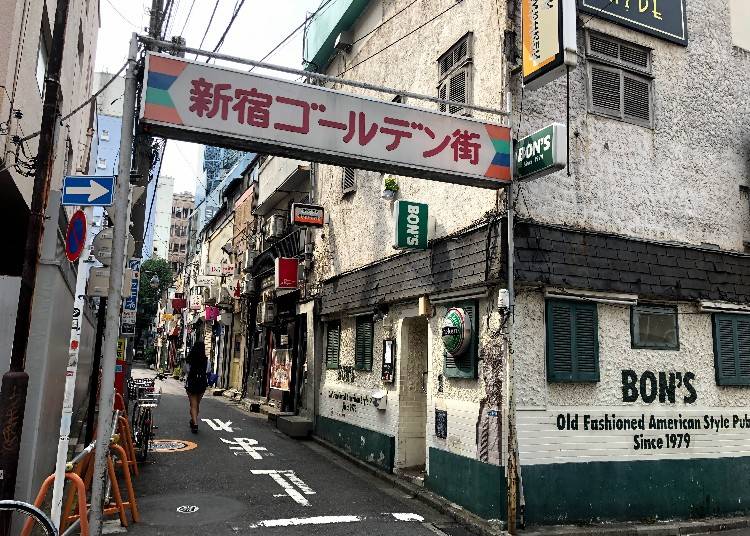
The entrance to Shinjuku Golden Gai, Tokyo’s charismatic treasure trove of micro bars.
Welcome to Shinjuku Golden Gai, where about 200 tiny bars, pubs, and restaurants share about 3 hectares of space! Every Tokyo guide will tell you to absolutely go to Golden Gai, the tiny spot near Shinjuku’s nightlife hot spot of Kabukicho, and there’s good reason for that. In Golden Gai, you’ll meet people from all walks of life willing to share a drink and a story, whether they’re locals, tourists, or barkeepers. The place flourished since long ago thanks to its direct adjacency to Kabukicho, but a lot of little bars had to close around 1985 due to the bubble era’s soaring real estate prices. Once that era ended, 200 little bars had become 140, but those resisted redevelopment and eviction to keep the spirit of Golden Gai alive.
These efforts have paid off – recent years have rekindled the liveliness of the area, primarily driven by tourists from overseas. The retro atmosphere is reminiscent of Japan’s Shōwa period (from the 20s to the 80s) and draws people in with its unique magic. In 2009, Golden Gai was awarded two stars in the Michelin Green Guide Japan.
In this atmospheric area, we’ll visit the third curry spot on our list: Epitaph Curry.
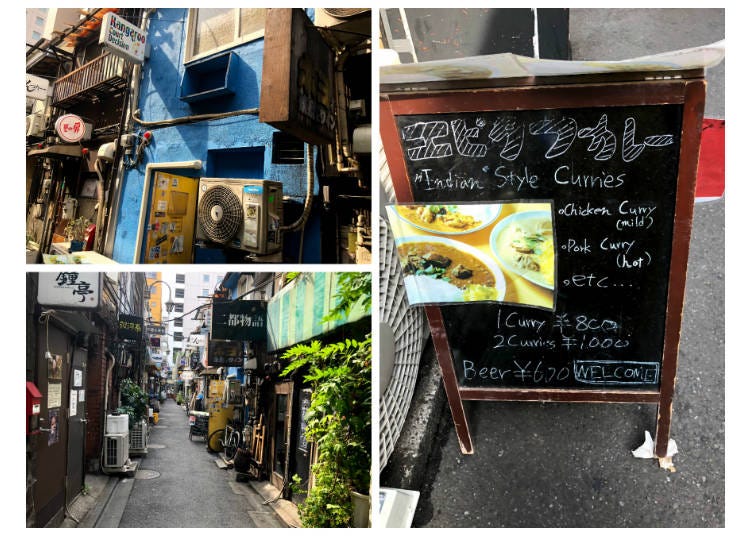
1) Look for the blue building with a bright yellow door. It has a distinct sign that says “Kangaroo Court Decision.” 2) When Epitaph Curry is open, this black signboard in front of the shop welcomes guests. The menu of the day is listed in both Japanese and English. 3) The streets of Golden Gai and its many little bars.
Epitaph Curry cozily sits in one of Golden Gai’s wonderfully crowded alleys. Look for a blue building with a yellow door, as well as a sign that says “Kangaroo Court Decision.” As you may have guessed, this curry place transforms into a bar with that creative name once the sun has set, while curry is served outside the bar hours. Epitaph Curry’s owner also works as a barkeeper for Kangaroo Court Decision on Mondays.
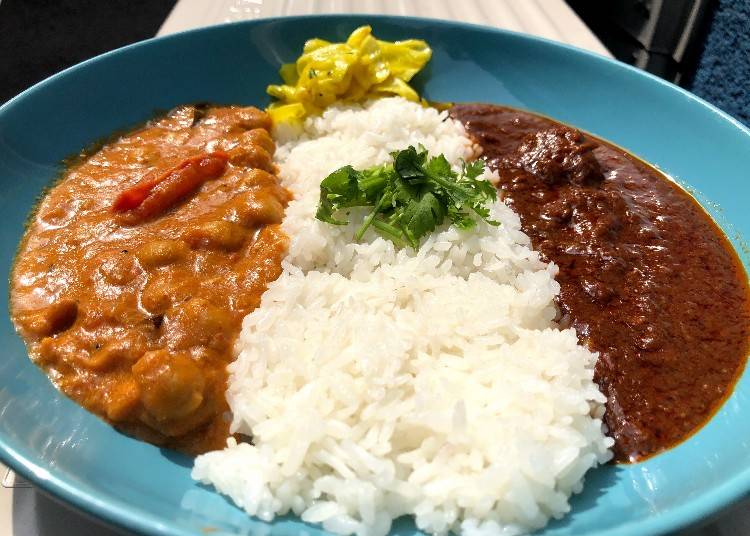
Pork Vindaloo (right) and Chickpea Coconut Masala (right) in one dish for 1,000 yen. Only one kind of curry can be had for 800 yen. The garnish is lemon-seasoned cabbage and cilantro.
Epitaph Curry takes you to South India, tickling your taste buds with this local curry style. There’s always three kinds of curry available and the main choice is whether you want to try only one or a plate with two. Originally, the little shop only served one kind of curry per plate, but the mixed plate was requested by so many people, it was introduced pretty much right after opening. When we visited Epitaph Curry, we had a choice between Pork Vindaloo, Chickpea Coconut Masala, and Chicken Pepper Fry. Our first choice was the Pork Vindaloo, based on a local dish of Goa in western India. The rich flavor boasts plenty of spices and a delicious sourness, matching rice to perfection! We also tried the Chickpea Coconut Masala. Its coconut-cashew paste and tomato combination makes for a mild flavor. Infused with plenty of chickpeas, it’s a pleasant texture and fun to eat.
The Chicken Pepper fry was sold out, unfortunately, but we were told that it’s a chicken curry with plenty of black pepper and a rich taste of tomato and onion. Currently, the shop is also developing a new flavor experience: a Chinese-style curry with star anise and Sichuan pepper!
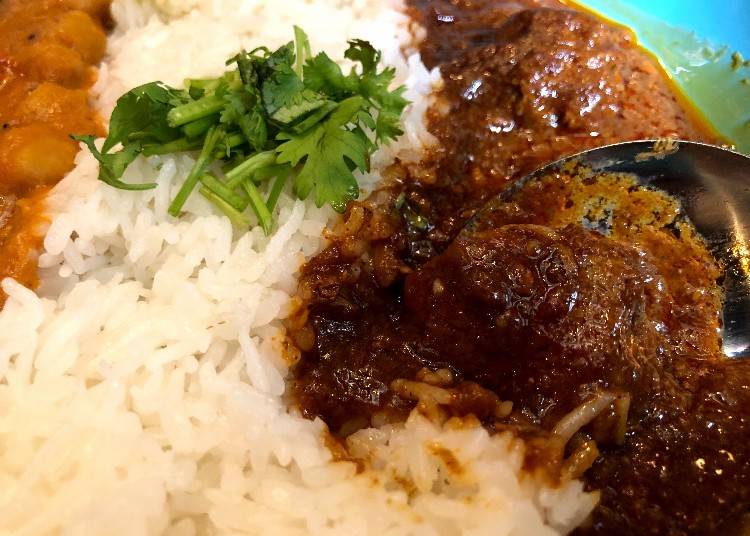
The pork is amazingly tender and rich in taste!
The Pork Vindaloo is Epitaph Curry’s most iconic dish. Eating pork can be uncommon for Hinduists and some don’t do it at all, but Goa has been a Portuguese province once and thus a large portion of Christians. Pork is a more common ingredient than in other parts of India and incidentally, pork is a favorite for Japanese curry as well! The rice served along with it is a high-grade Basmati rice, blended with Japanese rice. It unites the best of both worlds while treating you to an exquisite flavor experience!
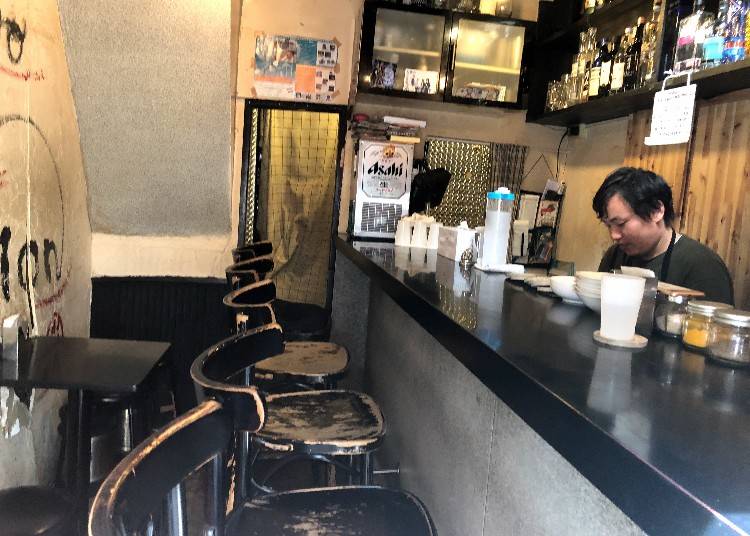
Epitaph Curry has five counter seats and two tables. It’s a narrow little shop that perfectly captures the unique atmosphere of Golden Gai. The shopkeeper was once a DJ and called himself Epitaph, which is where the name of the curry place comes from.
We asked him why he chose to run a “tenant” curry shop, sharing the space with a bar. “Starting a proper business costs a lot of money, so I first started like this. If this is successful, I want to open my own place.” These kinds of shared spaces have been rather common in Japan lately, a trend fueled by people like Epitaph Curry’s storekeeper who wants to “serve delicious curry but money is a difficult topic.”
The curry shop is open during daytime when the bar is closed. If the owner of the place trusts the shopkeeper and would rather see the space used than simply closed for several hours, nothing stands in the way of running a curry shop like that! It’s certainly a place that is as warm and welcoming as the curry is delicious!
-
Epitaph Curryエピタフカレー
- Address 〒160-0021 東京都新宿区歌舞伎町1-1-6 / 1-1-6 Kabukichō, Shinjuku-ku, Tokyo 160-0022, Japan
-
Nearest Station
Shinjuku-sanchōme Station (Toei Shinjuku Line, Tokyo Metro Marunouchi and Fukutoshin Line), 5 minutes on foot
- Phone Number 03-3204-6086
Hours: 12:00 p.m. – 3:30 p.m. (open until 5:00 p.m. on Sundays) *closes when sold out.
Closed: Tuesdays, ever 1st, 3rd and 5th Wednesday of the month.
*Prices and options mentioned are subject to change.
*Unless stated otherwise, all prices include tax.
Popular Tours & Activitiess
-

At This Zen Hideaway in Shinjuku,Master the Way of Tea with English Guidance,Matcha,and Wagashi This April
by: Guest Contributor
-

To the Holy Land of Kawaii! Odakyu Tama Center Station Is Becoming a Dreamy Sanrio Wonderland
by: Guest Contributor
-
Ad

5 Recommended Wagyu Yakiniku Restaurants in Tokyo: Signature Dishes, Premium Beef, and Secret Sauces
-

From Haneda to Monchhichi's Hometown! Scenic Monorail Ride & Katsushika 'Old Downtown' Walk
by: Guest Contributor
-

Farewell, Heavy Suitcases! Keisei Ueno’s New Service Makes Your Last Day in Tokyo Totally Hands-Free
by: Guest Contributor
-

Where to Buy a Japanese Kitchen Knife? Why Travelers Choose MUSASHI JAPAN's 14 Stores in Tokyo, Kyoto, and Nara
by: Guest Contributor
-

Essential Tokyo: The Complete Guide to Ikebukuro Station
-

Japan's Bath Culture: Tips You Should Know!
-

Autumn in Japan 2026: Fall Foliage Forecast & Where to Enjoy the Colorful Leaves (+Tour Info)
-

Battle of The Spices! Akihabara's Best Curry Restaurants
-

Our Korean VS. Japanese Editors Face Off Over Tokyo's Crazy 'Curry Soups' - But Could They Face the Fire?
-

Kichijoji – Explore Tokyo’s Top-Rated Stylish Suburb in Half a Day!
- #best ramen tokyo
- #what to buy in ameyoko
- #what to bring to japan
- #new years in tokyo
- #best izakaya shinjuku
- #things to do tokyo
- #japanese nail trends
- #what to do in odaiba
- #onsen tattoo friendly tokyo
- #daiso
- #best sushi ginza
- #japanese convenience store snacks
- #best yakiniku shibuya
- #japanese fashion culture
- #best japanese soft drinks


















